Overview
The article identifies the seven premier types of law for aspiring legal professionals, emphasizing:
- Corporate law
- Criminal law
- Family law
- Intellectual property law
- Environmental law
- Tax law
- Health law
- Immigration law
- Real estate law
as critical areas of opportunity. Each specialization is bolstered by current trends, salary projections, and the evolving complexities within the legal landscape. This illustrates the increasing demand for skilled practitioners in these fields as they navigate unique challenges and regulations.
What does this mean for your career? The legal profession is not only diverse but also ripe with potential for those willing to adapt and excel.
Key Highlights:
- Boutique Recruiting offers personalized recruitment solutions for legal careers, enhancing job satisfaction and organizational fit.
- The firm connects high-caliber candidates with law firms in the U.S. and Canada, adapting to trends like hybrid work models.
- Corporate law is growing, with salaries projected to average $172,329 by 2025, reflecting high demand for expertise in business transactions.
- Criminal law involves defending the rights of the accused, with a projected increase in defendants and evolving crime patterns by 2025.
- Family law attorneys navigate sensitive issues like divorce and custody, with mediation reducing conflict by 30% in recent cases.
- Intellectual property law protects creators’ rights, with patent litigation often exceeding $3 million, emphasizing the need for skilled representation.
- Environmental law addresses critical issues like pollution and climate change, with average salaries around $120,000 due to increasing demand.
- Tax law requires a deep understanding of regulations, with 67% of executives finding ESG regulation complex, heightening the need for tax lawyers.
- Health law focuses on compliance and patient rights, with health law attorneys earning about $120,000 as of 2025.
- Immigration law guides clients through complex regulations, with an emphasis on advocacy amid evolving policies affecting immigrant families.
- Real estate law governs property transactions, with a rising demand for attorneys as pending disputes increase, highlighting the need for legal expertise.
Introduction
In the dynamic realm of law, a multitude of specializations arise, each presenting distinct challenges and opportunities. From the complexities of corporate law to the emotional intricacies of family law, aspiring legal professionals encounter numerous pathways to pursue. As the demand for specialized expertise intensifies, so does the necessity for customized recruitment solutions that effectively align candidates with the appropriate firms. This article explores the diverse fields of law, analyzing current trends, salary expectations, and the essential skills required for success. By grasping the nuances of each practice area, legal professionals can adeptly navigate their career trajectories and make significant contributions to the justice system.
Boutique Recruiting: Tailored Recruitment Solutions for Legal Careers
Boutique Recruiting distinguishes itself in the recruitment landscape by providing personalized solutions tailored to the specific needs of individuals in the law sector. By emphasizing a profound understanding of both candidates’ career aspirations and employers’ requirements, the firm ensures that placements go beyond mere job filling; they foster long-term career satisfaction and organizational compatibility. This customized approach enables Boutique Recruiting to connect high-caliber candidates with law firms and departments that resonate with their values and career objectives.
With open positions available across the U.S. and Canada, Boutique Recruiting features a comprehensive job board that keeps candidates updated on current opportunities. Recent trends reveal that the adoption of hybrid work models is becoming critical in the law sector, shaping strategic hiring practices. As law firms expand into new specialties and embrace technological advancements, the demand for professionals adept at navigating these changes is on the rise. Boutique Recruiting’s expertise in these evolving areas positions it as a trusted partner for firms looking to adapt.
Statistics show that personalized recruitment strategies significantly enhance candidate placement success rates in law sectors, with studies indicating that firms employing tailored approaches experience a 30% increase in successful placements. Client testimonials underscore this effectiveness; for example, Eric Eddy, a CPA, commended the firm’s ability to deliver top-tier candidates swiftly and efficiently, stating, “I know I can always count on top quality candidates.” Such feedback reinforces Boutique Recruiting’s reputation for excellence in recruitment. By prioritizing the cultivation of lasting relationships and understanding the intricacies of company culture, Boutique Recruiting not only meets the technical qualifications of candidates but also ensures their seamless integration within the organizational environment.
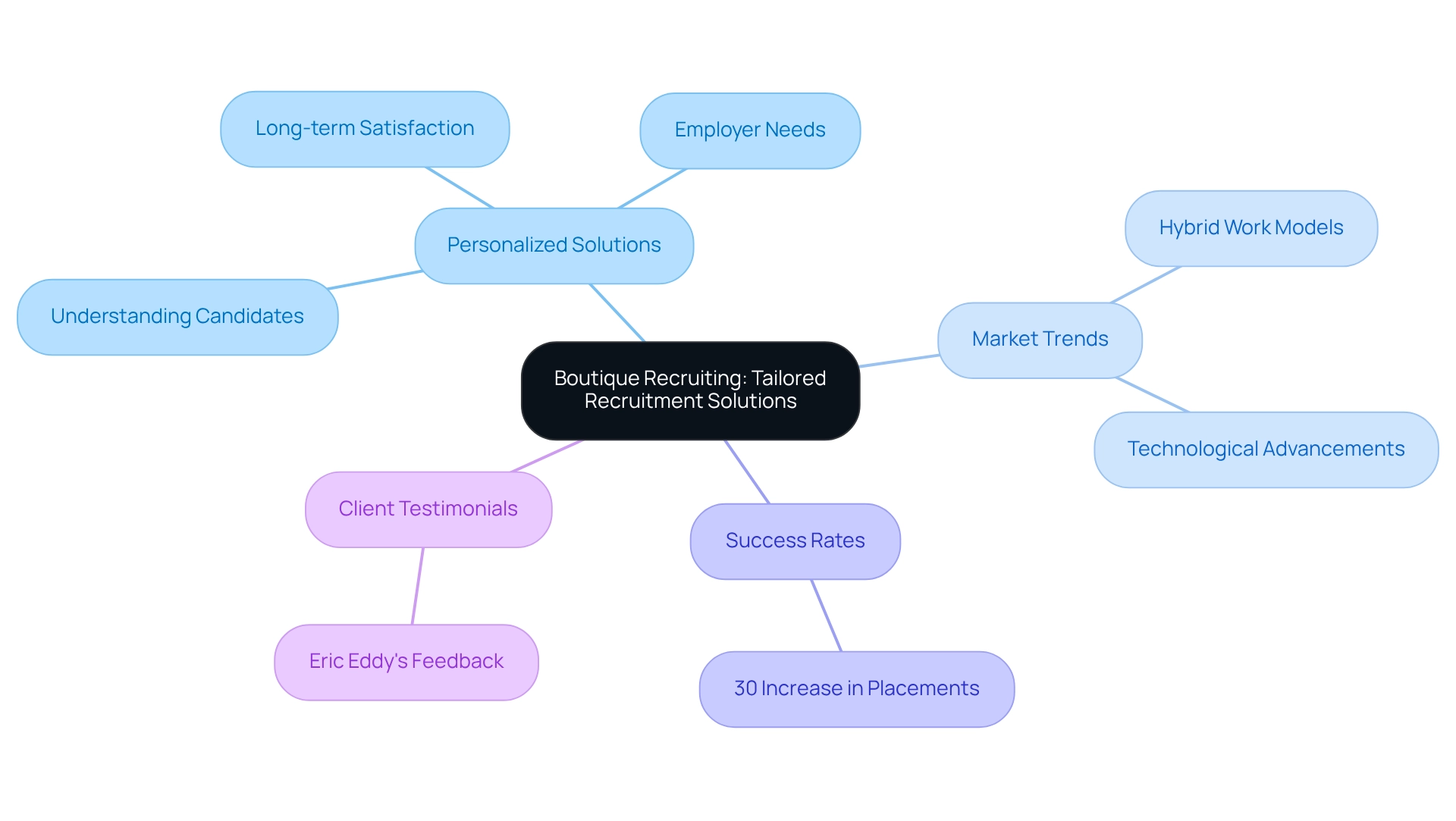
Corporate Law: Navigating Business Transactions and Compliance
Corporate law encompasses the regulatory dimensions of business transactions, including mergers, acquisitions, and compliance with established standards. Aspiring professionals in this domain must command a thorough understanding of corporate governance, contract law, and the intricacies of business operations. This specialization is essential for companies aiming to adeptly navigate regulatory frameworks while maximizing profitability. Legal experts in corporate law play a pivotal role in advising businesses on risk management and compliance, a necessity that is increasingly critical in today’s dynamic market.
The corporate law employment sector is experiencing significant growth, driven by the escalating demand for professional expertise in business transactions. By 2025, corporate lawyers are projected to earn an average annual salary of $172,329, with a notable range from $97,568 to $304,374. This range reflects the high value attributed to their skills and the variability influenced by experience and geographic location. For instance, a corporate lawyer practicing in Chicago earns an average of $149,049, highlighting regional salary disparities shaped by market demand.
Recent case studies underscore the influence of work experience on salary trajectories within corporate law. Entry-level corporate lawyers typically earn an average of $112,430, while those in the later stages of their careers can earn up to 45% more. This disparity accentuates the significance of accumulating experience and expertise in the field, as it directly correlates with salary advancement.
Furthermore, corporate governance has emerged as a focal point in business transactions, where compliance and regulatory adherence are of utmost importance. Effective governance structures not only mitigate risks but also bolster corporate reputation and operational efficiency. As Hanna Royce, Assistant Dean of Career Services, articulates, “To be successful in a remote environment, employees need to make the extra effort to communicate and stay connected with colleagues.” This perspective resonates within the collaborative nature of corporate law, where communication is vital for ensuring compliance and effective governance.
In conclusion, corporate law remains a highly sought-after specialization, offering lucrative career opportunities for aspiring practitioners prepared to navigate the complexities of business transactions and compliance.
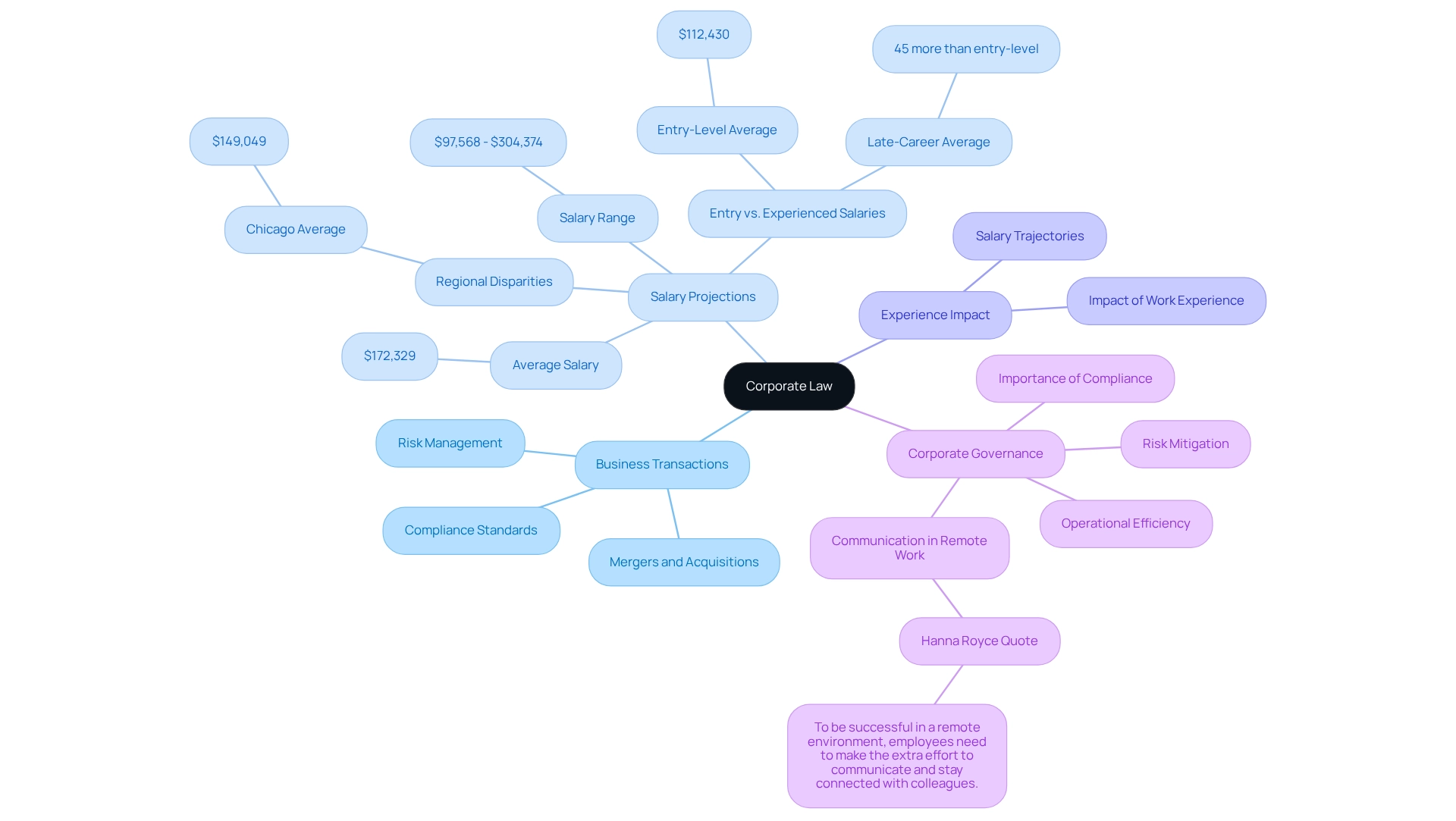
Criminal Law: Defending Rights and Upholding Justice
Criminal law is fundamentally concerned with offenses against the state, centering on the prosecution of individuals accused of crimes. Legal experts in this arena play a pivotal role in defending the rights of the accused while ensuring that justice prevails. Mastery of judicial procedures, evidence, and effective courtroom advocacy is essential for success in this field. Aspiring lawyers must be prepared to navigate high-stakes situations that can profoundly affect lives, rendering criminal law both a challenging and rewarding career path.
As we look to 2025, the landscape of criminal law continues to evolve, presenting significant implications for legal professionals. For instance, the number of defendants with release conditions has surged to 28,609, marking a 9 percent increase. This trend underscores the growing complexity of handling such matters and highlights the necessity for lawyers to adapt their strategies to effectively advocate for their clients. Additionally, the proportion of drug incidents involving heroin and marijuana has steadily declined over the past five years, indicating shifting patterns in criminal activities.
The average income for criminal defense lawyers in 2025 is projected to be competitive, reflecting the demand for skilled advocates in this domain. However, attorneys face numerous challenges, including navigating the intricacies of federal matters. Ongoing proceedings against high-profile figures, such as Trump, can create unpredictable trial timelines and necessitate adept management of public scrutiny.
As noted by John Gramlich, over eight-in-ten federal criminal defendants in the United States faced charges related to broad categories of crime. These include:
- Drug offenses (31%)
- Immigration offenses (25%)
- Firearms and explosives offenses (16%)
- Property offenses (11%)
This statistic emphasizes the diverse nature of cases that attorneys may encounter, further illustrating the importance of a comprehensive understanding of criminal law.
Effective criminal defense strategies often hinge on a thorough grasp of both the law and the nuances of individual cases. For example, the Bankruptcy Appellate Panels (BAPs) reported a 7 percent decrease in total filings, revealing varied trends across different regions. This decrease highlights the necessity for attorneys to remain flexible and knowledgeable about the evolving regulatory environment. As criminal law continues to play a vital role in defending rights, the commitment to justice and advocacy remains paramount for those pursuing a career in this dynamic field.
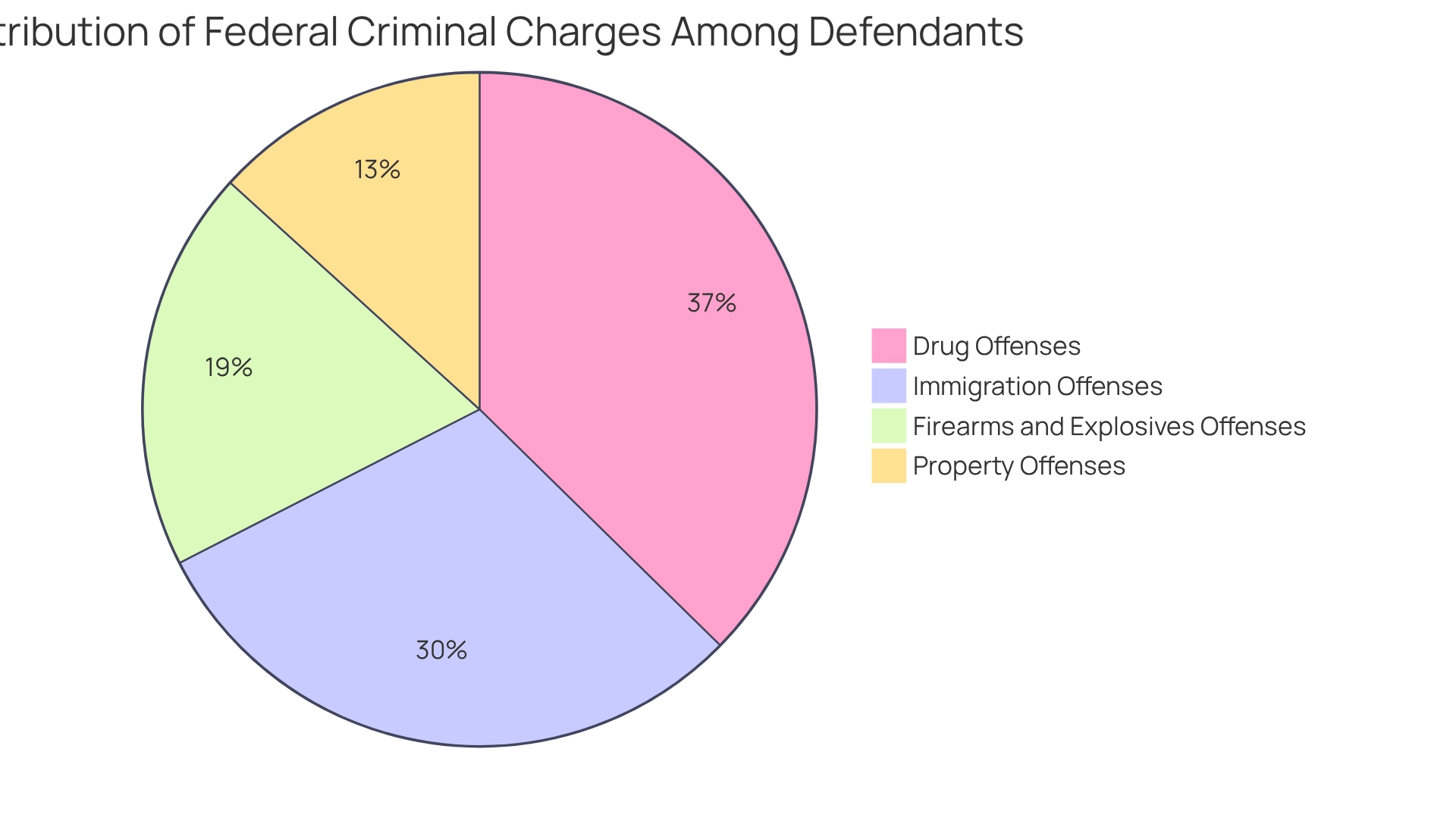
Family Law: Supporting Families Through Legal Challenges
Family law encompasses a range of critical issues, including marriage, divorce, child custody, and adoption. Legal professionals in this domain must adeptly navigate emotionally charged situations, balancing sensitivity with professionalism. Their pivotal role involves guiding families through complex legal challenges, ensuring that the best interests of children and families remain at the forefront. In 2025, the average salary for family attorneys reflects the demand for skilled professionals, with many receiving competitive compensation due to the intricacies involved in these matters.
Key responsibilities of family law attorneys include:
- Advocating for clients in divorce proceedings
- Negotiating child custody arrangements
- Facilitating adoption processes
Successful divorce mediation exemplifies the effectiveness of collaborative approaches in resolving disputes amicably, often leading to improved outcomes for families. For instance, a recent case study highlighted how mediation resulted in a 30% reduction in conflict between divorcing parents, facilitating a smoother transition for their children.
Expert perspectives shed light on the emotional difficulties faced by clients in family law, underscoring the necessity for attorneys to provide not only support but also compassionate guidance. As noted by a family law expert, “Attorneys must be equipped to handle the emotional turmoil that often accompanies family disputes, ensuring clients feel supported throughout the process.” Statistics reveal that 88.2% of custodial parents with child support arrangements view these agreements as formal judicial orders, emphasizing the essential role family law attorneys play in ensuring compliance and support.
Recent modifications in family legislation in 2025, including new mediation requirements and revised child support guidelines, have influenced how matters are managed, reflecting evolving societal norms and the increasing complexity of family dynamics. The emotional challenges inherent in family law cases can significantly impact clients, making it essential for attorneys to possess both legal knowledge and emotional intelligence.
The impact of divorce laws on families is profound, as evidenced by the doubling of the divorce rate among individuals aged 50 and older over the past two decades, according to Bowling Green State University. This trend underscores the necessity for family law attorneys to adeptly navigate the intricacies of modern family structures. Case studies on family law and child custody outcomes reveal the importance of tailored strategies that consider the unique circumstances of each family, ultimately fostering healthier resolutions.
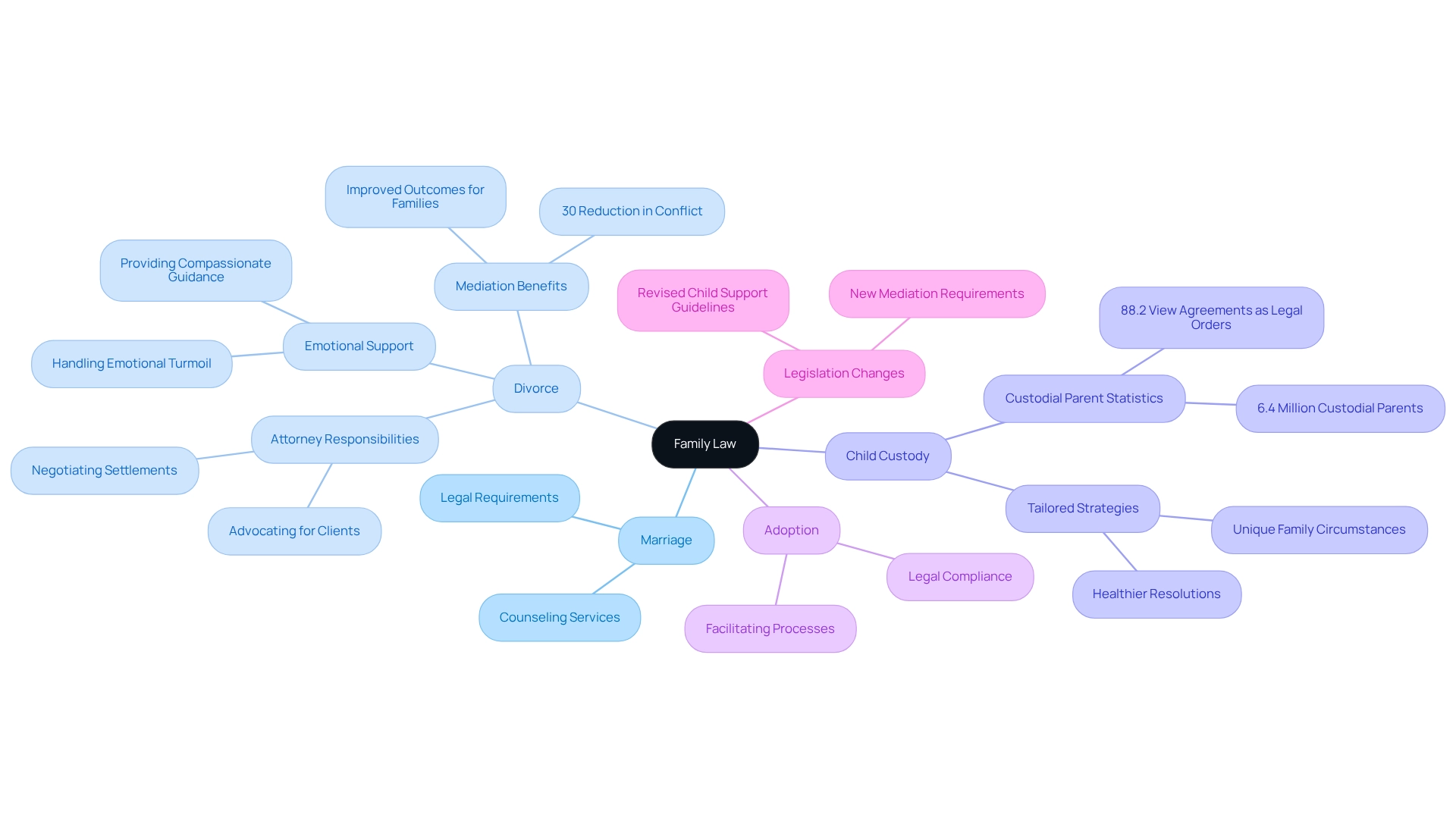
Intellectual Property Law: Safeguarding Innovations and Creations
Intellectual property law is crucial for safeguarding the rights of creators and inventors through mechanisms such as patents, copyrights, and trademarks. As technology advances rapidly, the demand for professionals adept at navigating the complexities of intellectual property rights has surged. This field not only protects innovations but also fosters creativity and economic growth by ensuring that creators can secure their rights in a competitive marketplace.
Understanding the regulatory frameworks that support intellectual property is vital for aspiring attorneys. For instance, the average duration of patent litigation matters from filing to resolution was 32 months in 2023, highlighting the intricate nature of these disputes. Additionally, the financial ramifications of intellectual property litigation are substantial; defending against a patent lawsuit can exceed $3 million, often forcing smaller companies to settle quickly to avoid crippling costs. This reality underscores the necessity of having skilled legal representation in intellectual property matters.
In the digital era, where innovation is relentless, the role of intellectual property law becomes even more pronounced. It not only safeguards the rights of inventors but also stimulates investment in new technologies. Insights from IP law specialists emphasize the importance of a tailored strategy for each situation, ensuring that clients understand the measures they can adopt to protect their intellectual property effectively. As noted by Kashfian & Kashfian, LLP, “If you find yourself in the middle of an intellectual property dispute, it is essential to approach your case on an individualized basis and have a firm understanding of steps you can take to safeguard your IP.”
As the landscape continues to evolve, the average salary for intellectual property attorneys in 2025 reflects the increasing significance of this specialization, making it a lucrative and influential career option for aspiring practitioners. Moreover, staying informed about the latest changes in intellectual property law for 2025 is critical for individuals entering this field, as it influences the strategies and practices that practitioners must adopt to remain competitive. The importance of patents and trademarks in technology cannot be overstated, as they play a vital role in protecting innovations and fostering a thriving marketplace.
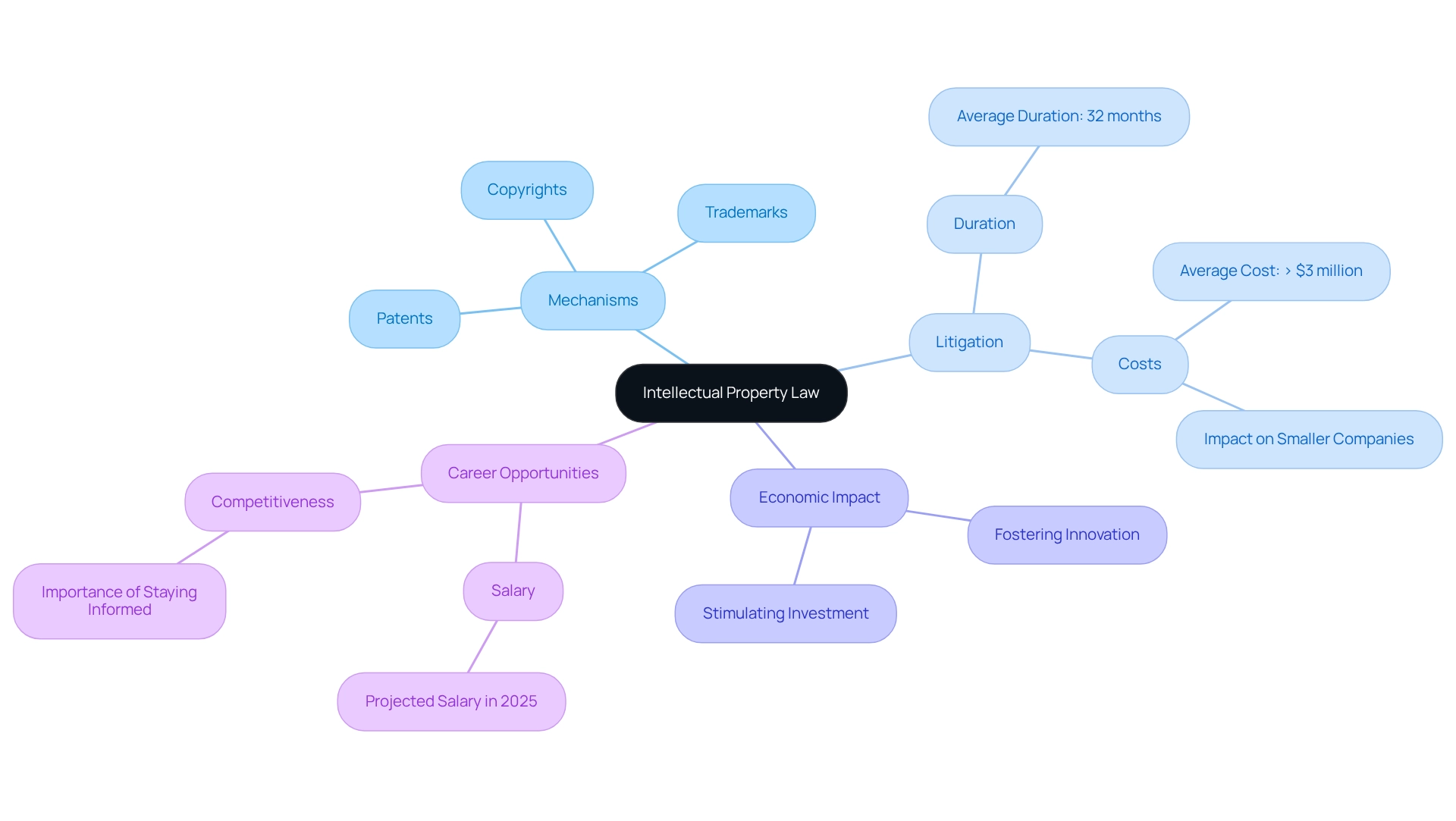
Environmental Law: Advocating for a Sustainable Future
Environmental law encompasses a broad spectrum of regulations and statutes designed to safeguard the environment and promote sustainability. Legal professionals in this field tackle critical issues such as pollution control, natural resource management, and the implications of climate change. As of 2025, the average salary for environmental lawyers is approximately $120,000, reflecting the growing demand for expertise in this area. Many earn competitive wages due to the increasing complexity of environmental regulations.
The relevance of environmental law has surged as society grapples with urgent ecological challenges. Recent advancements in 2025 emphasize the necessity for strong regulatory frameworks to tackle climate change and its effects on businesses. For instance, the number of environmental cases filed has evolved, with a notable decline in federal cases from approximately 300 in the late 1980s to fewer than 100 in the early 2020s. This indicates a significant shift in litigation strategies.
Case studies illustrate the importance of compliance and sustainability within environmental law. One significant example is the role of citizen suits, which empower individuals and organizations to hold the government accountable for environmental protections. These suits have broadened the scope of U.S. environmental legislation, although they encounter challenges related to standing and procedural constraints. The significance of citizen suits lies in their ability to foster accountability and drive compliance, making them a crucial mechanism in the fight for environmental justice.
Key issues tackled by environmental legislation include ongoing disparities in advocacy, especially for environmental groups centered on conservation-related disputes. Expert opinions emphasize that future strategies must prioritize these inequalities to enhance advocacy efforts and ensure that all voices are heard in the legal arena.
In today’s society, the impact of climate change regulations on businesses cannot be overstated. Legal professionals must navigate these evolving regulations while advocating for sustainable practices. As Oliver Schmidt, the former general manager of Volkswagen AG’s U.S. Environment and Engineering Office, noted, “The consequences of failing to adhere to environmental laws can be severe, impacting both the company and the community.” The field of environmental law not only offers a rewarding career path for aspiring lawyers but also plays a crucial role in shaping a sustainable future.
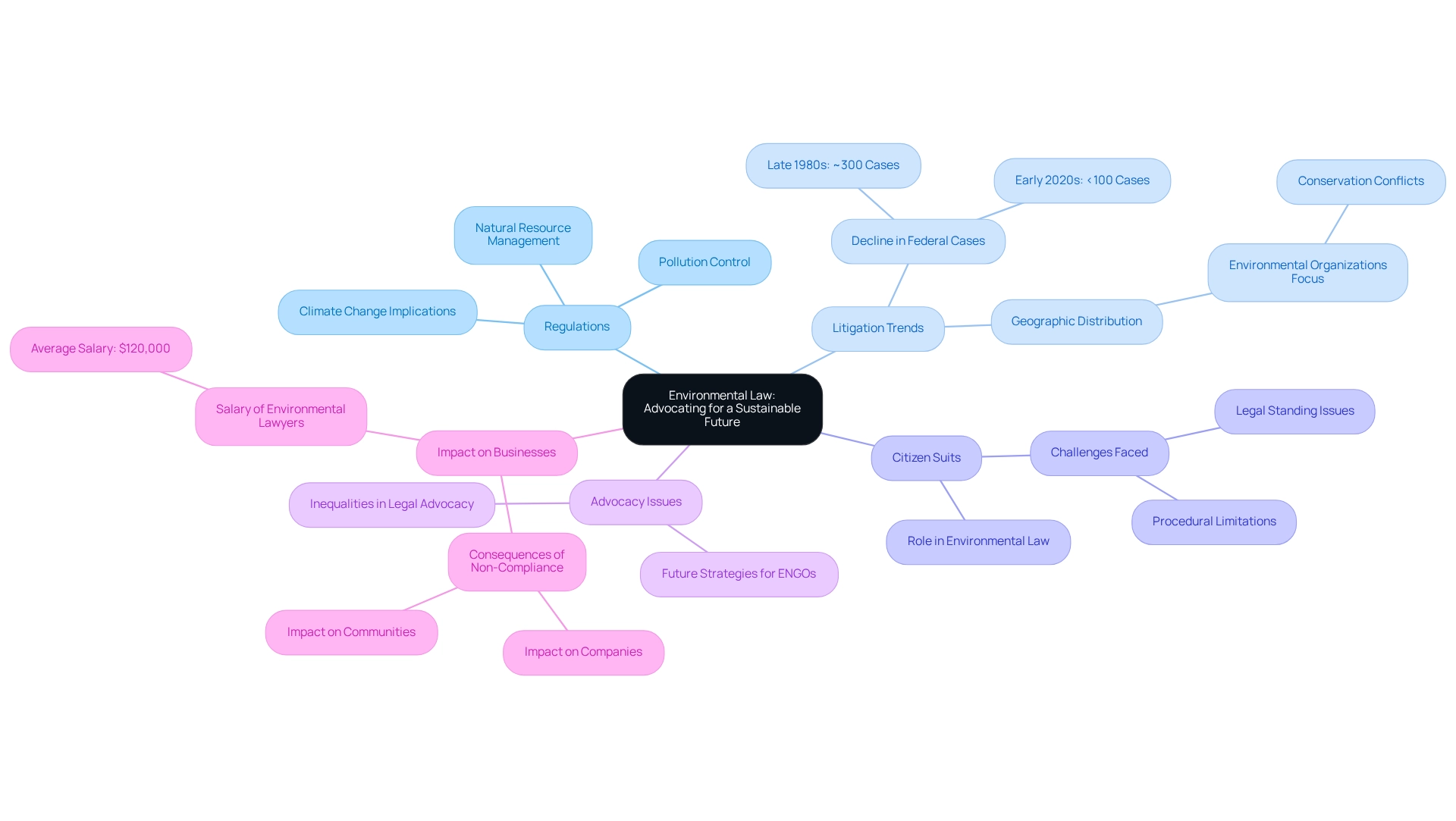
Tax Law: Navigating Complex Financial Regulations
Tax law is considered one of the best types of law as it encompasses the intricate regulations governing taxation and the obligations of both individuals and businesses. Legal experts specializing in this field must possess a profound understanding of tax codes, enabling them to advise clients on compliance and effectively represent them in disputes with tax authorities. Notably, 67% of global executives express that ESG regulation is overly complex, underscoring the heightened demand for skilled tax lawyers. Furthermore, 77% of organizations plan to transition to the next revision of applicable compliance frameworks, showcasing the proactive stance businesses are adopting in response to evolving regulations.
Aspiring attorneys should be prepared to navigate these complexities, developing strategies that not only ensure compliance but also optimize their clients’ tax positions. This specialization is essential for businesses aiming to successfully maneuver through the evolving landscape of the best types of law, especially in light of the 2025 updates that continue to reshape compliance requirements.
The IRS Taxpayer Advocate emphasizes, “Enhancing compliance is more effective when taxpayers receive proactive assistance rather than relying solely on audits.” This statement underscores the pivotal role tax lawyers play in guiding businesses through these challenges, rendering their expertise invaluable in today’s regulatory environment.
Moreover, aspiring attorneys should consider the average earnings for tax lawyers in 2025, reflecting the financial implications of pursuing this specialization. To prepare for a career in tax law, seeking internships or additional training in compliance strategies can provide a significant advantage.
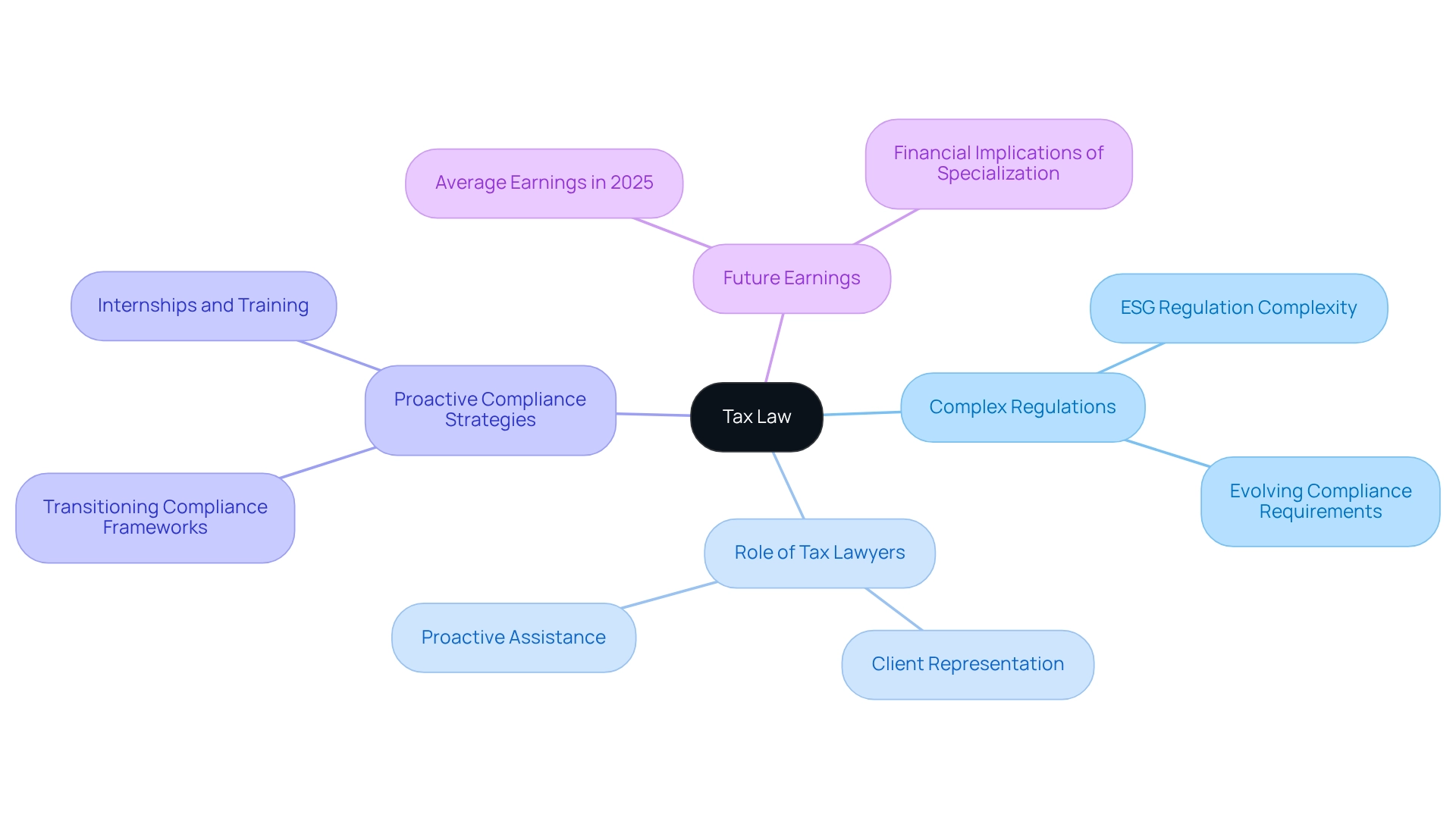
Health Law: Ensuring Compliance in Healthcare Practices
Health law encompasses a broad spectrum of regulatory matters that are critical to the effective delivery of healthcare, patient rights, and regulatory compliance. Legal experts in this area must possess a profound grasp of healthcare regulations, privacy statutes, and the ethical factors that oversee medical practices. As healthcare systems continue to evolve, the role of health law becomes increasingly vital, particularly in advocating for both patients and healthcare providers.
Successful advocacy in health law often hinges on thorough compliance with legal standards, essential for promoting access to quality care. Recent studies demonstrate how healthcare practices have maneuvered through intricate regulatory environments to ensure compliance with laws like HIPAA. These situations underscore the significance of performing due diligence on business partners to reduce risks linked to data breaches, thereby safeguarding patient health information (PHI).
Statistics indicate an urgent requirement for vigilance in this domain. According to the HIPAA Journal, in 2022, the average frequency of reported data breaches involving 500 or more records was about two per day, nearly twice the rate from 2018. The Department of Justice (DOJ) maintains a strict stance against unintentional violations, with penalties for filing false claims potentially reaching three times the program’s loss, plus $11,000 per claim.
Moreover, the Office for Civil Rights (OCR) has intervened in over 52,000 cases, providing guidance to HIPAA-covered entities before investigations or penalties were necessary. This underscores the critical nature of compliance in health law and its direct impact on healthcare delivery, particularly in ensuring that patient rights are upheld.
As of 2025, the average salary for health law attorneys is projected to be competitive, reflecting the growing demand for expertise in this field. Specific figures indicate that health law attorneys can expect to earn an average salary of around $120,000, making it an appealing career path for aspiring practitioners. With ongoing changes in health law and an increasing focus on patient rights, those entering this field will find ample opportunities to make a significant impact in the healthcare sector.
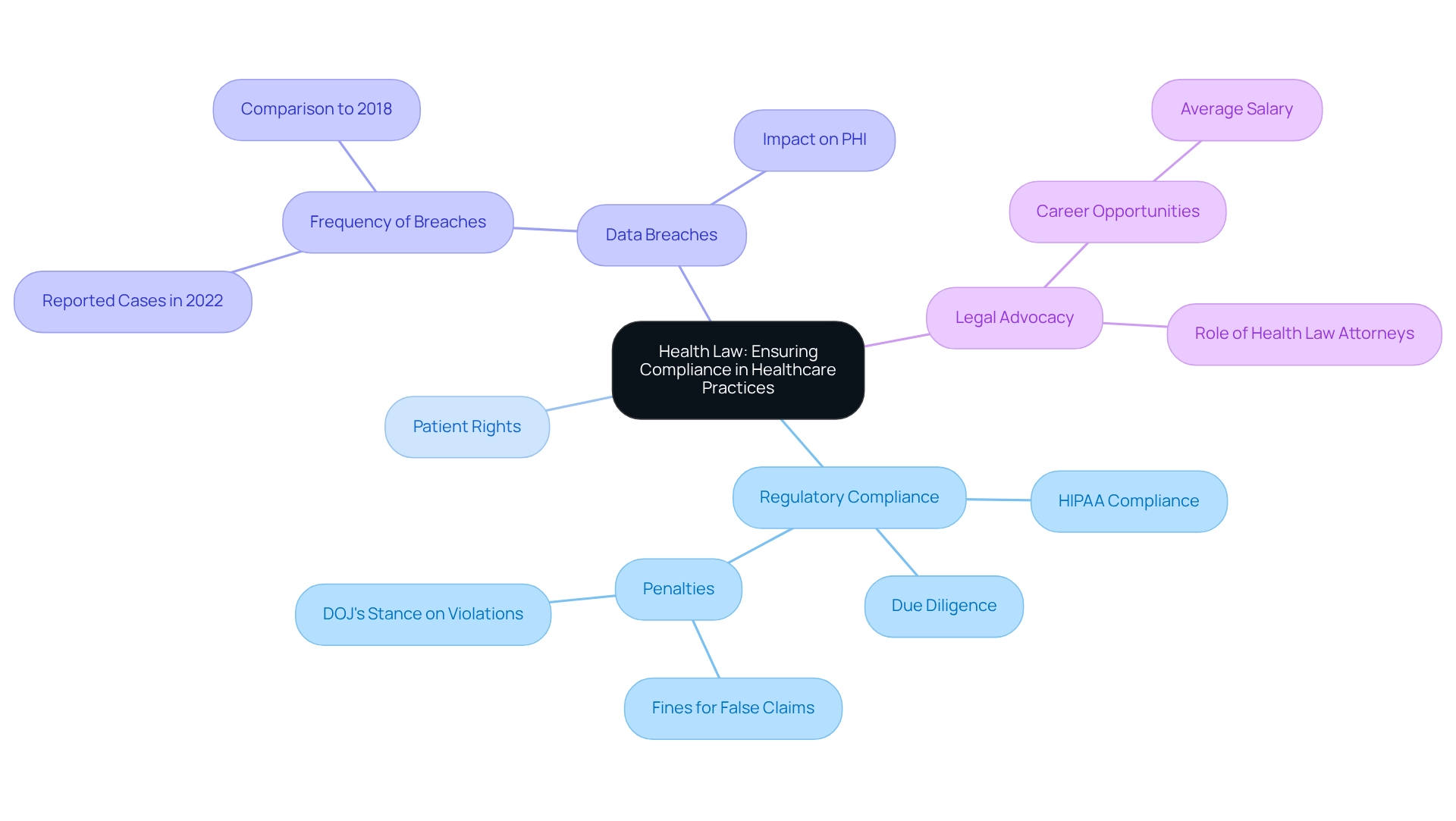
Immigration Law: Guiding Clients Through Legal Pathways
Immigration law governs the intricate procedures that permit individuals to enter, reside, and work within a nation. Professionals in this field play a pivotal role in guiding clients through the complexities of immigration regulations, assisting with visa applications, and addressing challenges related to their immigration status. As we approach 2025, the landscape of immigration law is dynamic, carrying significant implications for both individuals and attorneys. Recent statistics reveal that 42 percent of children of immigrants lived in low-income households in 2023, underscoring the socio-economic challenges faced by immigrant families and highlighting the critical need for advocacy in this domain.
Aspiring attorneys must prepare to advocate vigorously for their clients’ rights, ensuring they understand their options within the judicial framework. This advocacy is particularly vital given the challenges posed by evolving immigration regulations and policies, including recent changes linked to Title 42, which permitted the immediate expulsion of migrants during the COVID-19 pandemic. Insights from immigration law experts emphasize the necessity of staying informed about the latest developments, as these can significantly impact clients’ pathways.
Furthermore, the average salary for immigration lawyers in 2025 reflects the increasing recognition of this specialization, with competitive compensation attracting new talent to the field. As Patrick J. Lechleitner, ICE Deputy Director, stated, “With the public release of this enforcement data, ICE is demonstrating its commitment to openness and transparency.” This statement underscores the evolving nature of immigration enforcement and the essential role attorneys play in navigating these judicial pathways. As immigration issues continue to dominate public discourse, a deep understanding of key challenges in immigration law becomes increasingly crucial for aspiring attorneys.
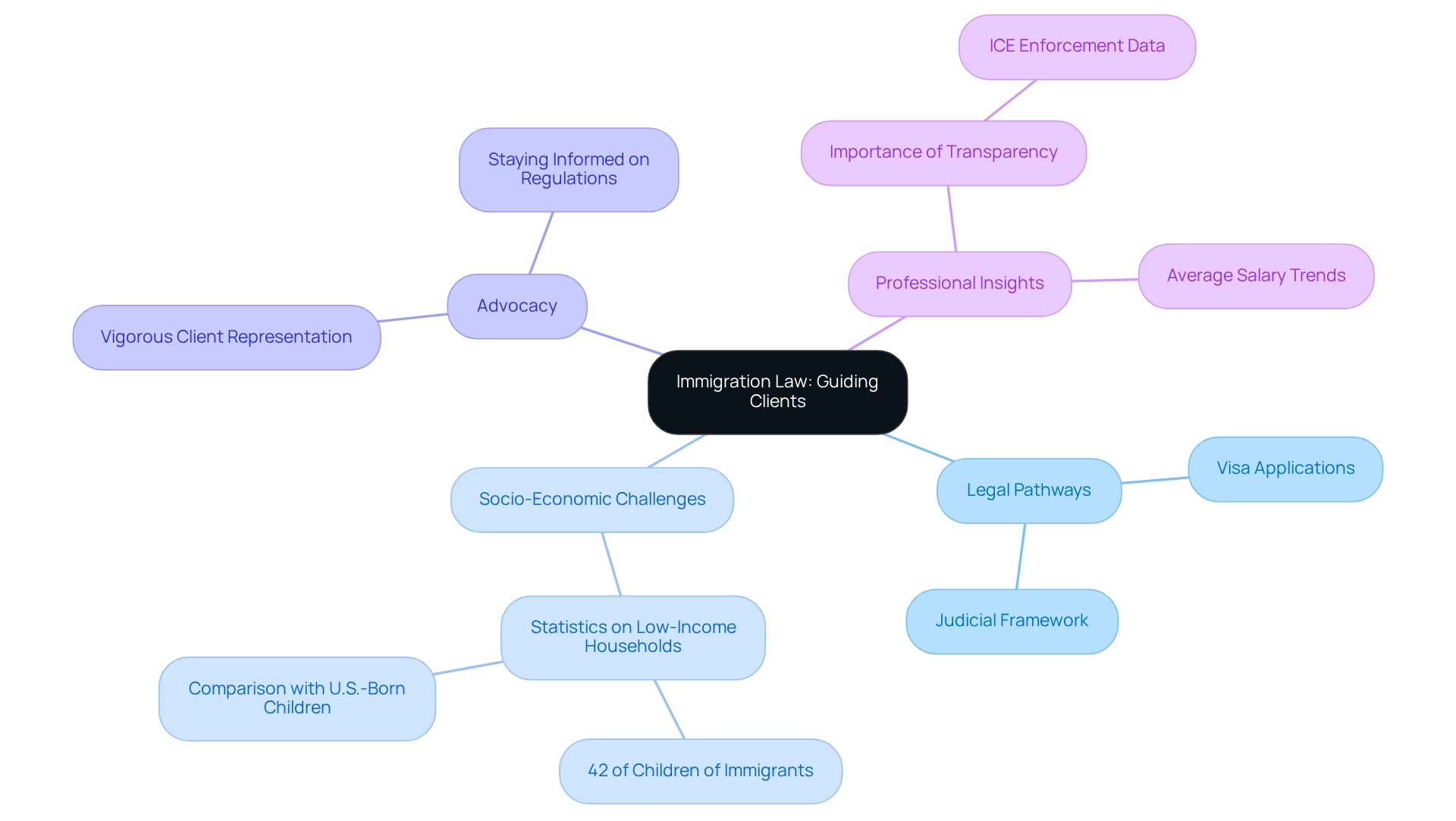
Real Estate Law: Facilitating Property Transactions and Disputes
Real estate legislation governs the intricate framework surrounding property transactions, encompassing buying, selling, leasing, and managing real estate. Legal experts in this field must possess a thorough grasp of property rights, zoning regulations, and contract negotiations. With the number of pending defendants in real estate disputes rising by 1 percent to 122,764, the demand for skilled lawyers is unmistakable. Aspiring attorneys should excel at facilitating transactions and resolving disputes, ensuring that their clients’ interests are safeguarded, as these skills are integral to the best types of law, which are crucial for both individuals and businesses due to the substantial financial commitments involved in real estate transactions. In 2021, a significant 86% of purchasers employed real estate agents or brokers, underscoring the complexity of these transactions and the necessity for professional expertise. Moreover, recent changes in real estate legislation in 2025, such as modifications in zoning regulations and revisions to property tax statutes, highlight the importance of remaining informed about evolving regulations and market trends.
Essential skills for those in real estate law include strong negotiation capabilities, meticulous attention to detail, and a comprehensive understanding of documentation. Successful case studies, such as those focusing on gender disparities in foreclosure rates, demonstrate the real-world implications of expertise in property transactions. Data from ATTOM Data Solutions indicates that male homeowners may face higher foreclosure rates than female homeowners, emphasizing the critical role of attorneys in managing these complexities. As the landscape of real estate continues to evolve, the role of attorneys remains indispensable in navigating the intricacies of property law.
As Nadia Evangelou, Senior Economist and Director of Real Estate Research, articulated at the March 2025 NAR Real Estate Forecast Summit, understanding these dynamics is essential for practitioners to effectively advocate for their clients. The integration of legal knowledge with current market trends will be vital for success in this field.
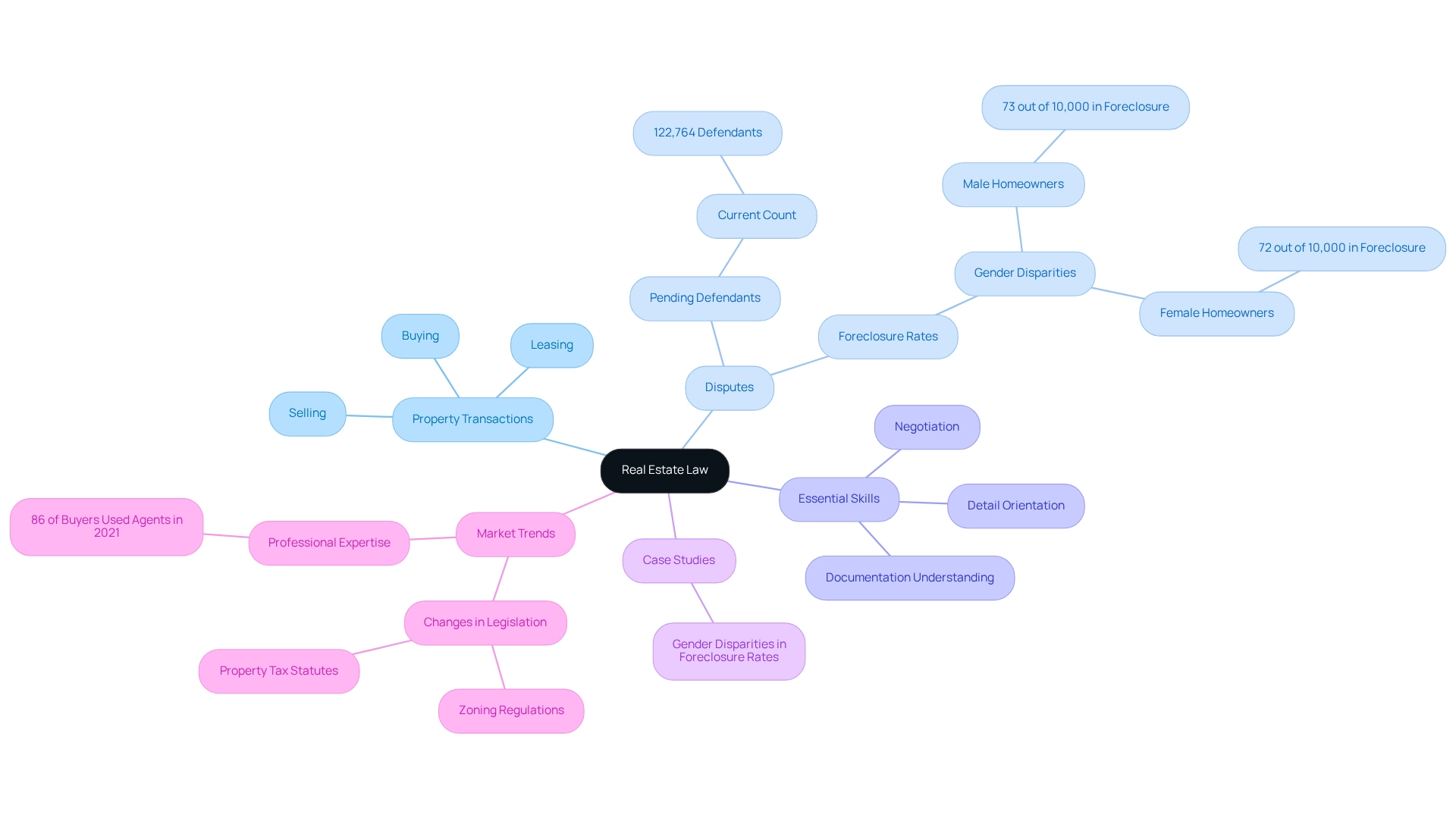
Conclusion
The legal profession presents a diverse array of specializations, each accompanied by its unique challenges, opportunities, and requirements for success. From the transactional intricacies of corporate law to the emotionally charged landscape of family law, aspiring legal professionals must navigate these varied pathways with a clear understanding of the skills required and the current trends shaping the industry. Notably, the demand for specialized expertise is surging, making tailored recruitment solutions essential for aligning candidates with the right firms.
Furthermore, the financial prospects across different fields of law underscore the lucrative nature of many legal careers, with salaries reflecting the value placed on specialized knowledge. Fields such as corporate law and intellectual property law stand out for their growth potential and the increasing complexity of legal frameworks. As the legal landscape evolves, professionals must remain informed about regulatory changes and emerging trends, ensuring they stay competitive and capable of effectively meeting client needs.
Ultimately, pursuing a career in law transcends mere financial gain; it encompasses making meaningful contributions to society and the justice system. By grasping the nuances of each legal specialization, aspiring attorneys can strategically position themselves for success while advocating for their clients and upholding the principles of justice. As the legal profession continues to adapt to societal changes, the opportunities for impactful careers abound, inviting new talent to make a significant difference in the world of law.
Frequently Asked Questions
What distinguishes Boutique Recruiting in the recruitment landscape?
Boutique Recruiting stands out by providing personalized recruitment solutions tailored to the specific needs of individuals in the law sector, focusing on understanding candidates’ career aspirations and employers’ requirements to foster long-term satisfaction and compatibility.
What types of positions does Boutique Recruiting offer?
Boutique Recruiting features open positions across the U.S. and Canada, accessible through their comprehensive job board that keeps candidates updated on current opportunities.
How is the law sector adapting to recent trends?
The law sector is increasingly adopting hybrid work models, which are shaping strategic hiring practices as firms expand into new specialties and embrace technological advancements.
What is the impact of personalized recruitment strategies in the law sector?
Personalized recruitment strategies significantly enhance placement success rates, with studies showing a 30% increase in successful placements for firms employing tailored approaches.
What do client testimonials say about Boutique Recruiting?
Client testimonials, such as from CPA Eric Eddy, praise Boutique Recruiting for delivering top-tier candidates swiftly and efficiently, reinforcing the firm’s reputation for excellence in recruitment.
What is the focus of corporate law?
Corporate law encompasses the regulatory aspects of business transactions, including mergers, acquisitions, and compliance with standards, requiring professionals to understand corporate governance, contract law, and business operations.
What is the projected salary for corporate lawyers by 2025?
By 2025, corporate lawyers are projected to earn an average annual salary of $172,329, with a range from $97,568 to $304,374, reflecting the high value of their skills and market demand.
How does work experience affect salaries in corporate law?
Work experience significantly impacts salary trajectories; entry-level corporate lawyers earn an average of $112,430, while those in later career stages can earn up to 45% more.
What challenges do criminal defense lawyers face?
Criminal defense lawyers face challenges such as navigating federal matters, managing unpredictable trial timelines, and handling public scrutiny, particularly in high-profile cases.
What types of crimes are most common among federal defendants?
Over eight-in-ten federal criminal defendants face charges related to drug offenses (31%), immigration offenses (25%), firearms and explosives offenses (16%), and property offenses (11%).